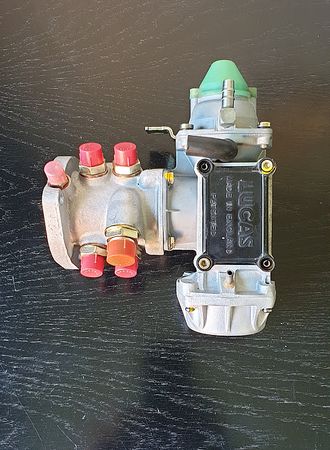Altitude Compensation Unit
Published: 23 Apr 2020 updated: 24 Apr 2020

Who has ever seen one of these I wonder?
This is a genuine Lucas product from the period towards the
end of the PI life as the world moved to Bosch mechanical systems then
Electronic Fuel Injection in short order and Lucas got out of the game. But not
before they produced a few test samples of this baby. So, what is it and how
does it work?
The main two units are the Metering section and Distribution section of what we generically know collectively, as the Metering Unit, but below the Metering part there is another unit. This is the Altitude Compensation Unit. I have only ever seen two. We fitted one years ago to the ex Roy Fidler Triumph 2000 with a factory installed TR5 engine. The owner was doing a lot of mountain driving and, as we all know, or at least those of us with mechanical PI, when you get to 2000m above sea level the fuelling goes so rich it is difficult to drive the car and you pray to be able to get lower down again.
Clearly if you lived at these altitudes the car would be no good to
you at all. This was Triumphs mechanical solution. The capsule on the
bottom detects atmospheric pressure and compensates by reacting against the
metering spring pressure to lean off the mixture proportional to altitude.
Simple but effective. I dare say that if PI had continued, all metering
units would have morphed into a version of this.
Neil Revington

